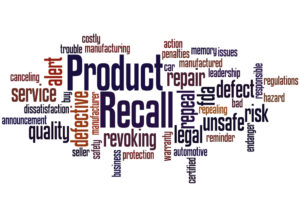
When purchasing a product, you’re likely thinking about how well it will work or how it compares to a similar product – not whether it will hurt you. After all, it’s on store shelves, so you assume it has undergone rigorous tests to rule out any possible harm.
The truth is that any product has the potential to be dangerous, and many companies cut corners to get the product on the market faster. There are thousands of potential situations like this: brakes failing on motor vehicles, prescription drugs causing serious side effects, faulty components in lifesaving medical devices, a child’s toy not warning users of choking hazards – the list goes on.
Consumers who are injured by a dangerous or defective product have the right to file a product liability lawsuit. This allows the harmed consumer to recover financial compensation from one or more entities responsible for the product, including the manufacturer, distributor, marketer or retailer. Having several people potentially responsible for the accident or injury caused by the item makes product liability law more complicated than other personal injury cases.
An experienced product liability attorney will know the intricacies of New Jersey state law and understand how to gather the proper evidence necessary to prove the product was dangerous, such as witness statements, engineering reports and other documents. They will be able to fight for clients’ rights in the courtroom if the case goes to trial and recover compensation for lost wages, medical bills, pain and suffering and more.
Hair Straightener Lawsuits Filed Due To Uterine Cancer Risk
The latest products to make headlines for product liability lawsuits are hair straighteners. Thousands of women, particularly Black and Latina women, have relied on chemical hair straightening products to achieve their desired look for more than a century. These “relaxers” work by breaking natural bonds in the hair, permanently eliminating any texture and leaving behind perfectly smooth strands. The harsh chemicals used in this process, combined with the high heat necessary to set the new style, can irritate or damage the hair and scalp.
But unlike most other hair products, straightening chemicals remain on the hair and soak into the scalp. These products can include carcinogenic chemicals like parabens, formaldehyde and phthalates. Women have been using these products without knowing that they might be putting their health at risk.
In October 2022, the National Institutes of Health (NIH) released a new study showing that women who regularly use chemical hair straighteners are nearly twice as likely to develop uterine cancer as women who use them occasionally or not at all.
More than 33,000 participants followed for approximately 11 years yielded 378 diagnosed cases of uterine cancer. Twenty-nine of these cases occurred in Black women; 14 in Latina women.
Another study, published in 2021 by Carcinogenesis, found that some chemical hair products containing estrogen-disrupting compounds can increase breast cancer risk in Black women, who are six times as likely than white women to develop the disease.
Shortly after the NIH study went public, lawsuits against various manufacturers of chemical hair relaxers were filed. The cases are being consolidated into multidistrict litigation (MDL) in the U.S. District Court for the Northern District of Illinois before Judge Mary M. Rowland.
Plaintiffs allege that using the products resulted in their uterine cancer diagnoses and that the companies knew or should have known of the risks but did not disclose them. Hair straightener lawyers are continuing to file lawsuits on behalf of injured women.
Types of Product Liability Cases
There are three categories of New Jersey product liability cases:
- Manufacturing defects – errors that occur during production (e.g., faulty machinery, careless employees) and cause a failure to meet design specifications; may affect a single product or every product in that round of manufacturing.
- Design defects – errors in the design itself of a whole class of products so that every piece has the same flaw causing unreasonable risk.
- Marketing defects – can occur in products that are not defective in the first two categories; this happens when the manufacturer fails to provide instructions on using the product safely or warnings about possible hazards.
Under the New Jersey Product Liability Act (NJPLA), all product liability claims are beholden to the concept of “strict liability,” which means that the plaintiff is not required to prove their injury was caused by the product. They must only prove that the product was not reasonably fit or safe for its intended use and can use any of the three categories above to do so.
How a Product Liability Lawyer Can Help
Product liability lawsuits are necessary because they hold anyone whose negligence contributed to a dangerous product responsible for their actions. A successful case can even spread public awareness of product safety, encourage other manufacturers to adopt higher standards, and push lawmakers to enact new legislation to keep future consumers safer. And most importantly, a seasoned product liability lawyer can help you recover significant financial compensation by taking all the work of the case off your hands while you focus on recovery.
If you or a loved one has been injured due to a dangerous or defective product, such as chemical hair straighteners, the personal injury attorneys at D’Arcy Johnson Day, a premier New Jersey litigation law firm, can help. Contact Jessica Ramirez at 866-327-2952 or fill out our online contact form to learn more about your options. Consultations are always free and confidential.

From sexual abuse matters to personal injury and workers compensation, Jessica brings a wealth of experience to her practice at D’Arcy Johnson Day. Her fluency in both English and Spanish enables her to help so many members of the community, as she focuses on sex assault and personal injury cases, work injuries, medical malpractice, immigration, criminal law, and municipal court proceedings among other areas of practice.















Comments for this article are closed.